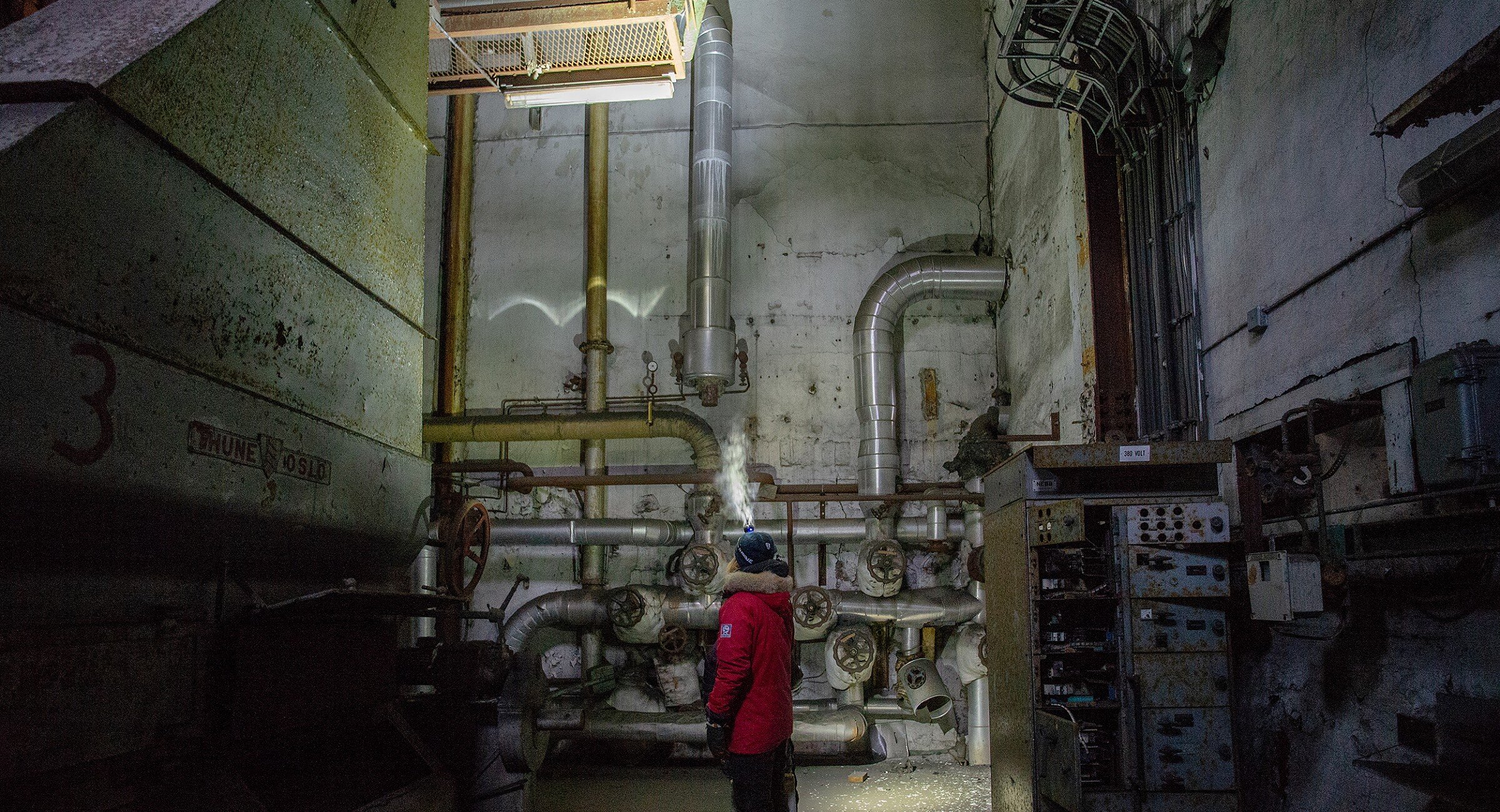
2021
For Artica Listens 2021 Ignas Krunglevičius, has created HARD BODY DYSPRAXIA, a sonic installation inside a disused coal power plant in Longyearbyen, Svalbard. The power plant was built in 1920 and after WWII saw various extensions and reconstructions. Finally closing down in 1983 when the new larger energy plant took over. Since then the doors have remained closed and the building untouched, until now.
Krunglevičius has brought into play his response to the architecture of the power plant, the sounds already present in the building and the wider context of its industrial history. Working with his own versions of rhythms and markers, Krunglevičius has used 24 audio channels to create an immersive installation, which manipulates the ambience and acoustic reverberation of the space. As you move through the rooms, muffled voices intermix with the loud echoing sounds of machinery, metal and feedback. However these sounds are not there to recreate a nostalgic or ghostly glimpse into the past, they are new, they come from current technology and they pull you into the present. The building’s contents may be slowly decaying, paint peels from the ceiling, decades of dust dulls the sound of your footsteps. But from the dust a new future is coming, what that future is, a community can decide.
Longyearbyen is not just a place of Northern Lights and polar bears, it is home to a community of people experiencing the daily effects of climate change. A community that is changing from industrial commerce to pioneering research, eco-tourism and culture. By hosting this audio and physical experience inside the old power plant, repurposing its use as an open, creative space we hope to begin a new story for this historical building and Longyearbyen.
The work will be premiering on September 18th 2021, 17:00 -18:30 as part of Art Night Longyearbyen, more info here
Exhibition runs: September 18th - September 25th 2021 and is FREE
Group viewings available on:
Wednesday 22nd September, 19:00-20:00
Friday 24th September, 19:00 - 20:00
Saturday 25th September, 11:00 - 12:00
or by appointment, email: info@articasvalbard.no to arrange a viewing.
The event is in collaboration with LPO as part of the FOSSIL project.
Ignas Krunglevičius was nominated by Office for Contemporary Art Norway (OCA) for a residency in November 2020. His research for Artica Listens began during this stay.
Photo and event trailer: Tom Warner
Ignas Krunglevičius
(b. 1979, Kaunas, Lithuania) is known for his highly innovative and experimental approach to art-making, often combining sound, text and imagery to create installations and sculpture which explore the intermix between the agency of power, economy, nature and existential realities generated by global technological development.
Krunglevičius currently lives and works in Oslo. He received his MA in music composition from Norwegian Academy of Music in 2010. From 2011 is co-directing the artist-run exhibition space Podium Oslo.
Krunglevičius’ works have been exhibited at the OCT Contemporary Art Terminal, Shanghai, China; Moscow International Biennale for Young Art, Russia; Kunsthall Oslo, Norway; Ultima, Oslo, Norway; Institute of Contemporary Art, Philadelphia, USA; Transmediale, HKW, Berlin, Germany; La Biennale di Venezia, Nordic pavilion, Italy and The 19th Sydney Biennial, Australia, amongst others.
Past Events
Artica Listens 2020
In 2020 together with Norwegian Pen, Artica Listens focussed on the most urgent issues that Svalbard and its inhabitants are facing.
At a time when mining is being phased out, tourism is growing, the proportions of Norwegians living on the island is declining and climate change is affecting both nature and people, we are asking ourselves the questions, where does the road go from here? What will Svalbard become, and for whom?
Artica Listens 2019
In 2019 Artica Svalbard and Office for Contemporary Art Norway (OCA) invited Cristina Lucas as the guest artist for Artica Listens 2019, co-curated by the two organizations.
'It seems natural to think that what begins has to end, but how easy is this to assume when it is our own species in question? Will it be possible to reverse the processes that otherwise undoubtedly lead us to a not so far off apocalypse?' – Cristina Lucas






